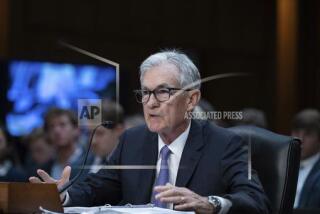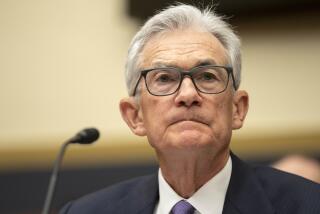5 of 8 Economists on Times’ Board Expect a Recession This Year
- Share via
Economists may be notorious for sharply differing forecasts, but The Times’ Board of Economists--whose views cut across the ideological spectrum--have emerged with, well, almost a consensus for 1988. And it’s not a cheerful one.
Of the eight board members, five conclude that a recession is ahead. Two hold the opposite view, with a third member leaning against a downturn.
Here is how Irwin L. Kellner, chief economist at Manufacturers Hanover Trust Co. in New York, put it for the gloomy majority: “I think a recession is not only very likely--but we well may have started it.”
But wait a second. What’s going on here? In recent weeks, the government has churned out an impressive batch of economic news. Housing starts and industrial production were up in November. Employment is robust. What’s more, a recent government survey found that companies were planning to spend a great deal of money on plant and equipment this year.
A notable exception came earlier this week, when the government reported an unusually steep decline of 1.7% in its index of leading economic indicators for November.
Less Consumer Spending
Nonetheless, the consensus within the economics profession remains that a recession can be avoided this year and that a major, 1930s-style depression is highly unlikely.
The recent flurry of good news has been enough to convince two members of the board that things are not so bad at all. “You add up the pieces of strength and it doesn’t look like a recession yet,” said George L. Perry, a senior fellow at the Brookings Institution in Washington. “It’s going to take another event to tip us into a recession.”
Those who warn of a slump are looking at different pieces of the puzzle, numbers that suggest Americans have begun to spend less and save more, a development that--in the short term, at least--could chill the economy. Further, there is evidence that consumers became more tight-fisted even before the October stock market debacle--which many took as a warning to hang onto their money.
Analysts pay a lot of attention to consumer spending because it adds up to two-thirds of the nation’s economic activity. (Slightly under half of this goes for items bought in stores; the rest goes for rent, health care, transportation and other services.)
Thinks Recession Likely
By 1987, consumers’ ardor for new goods had waned, which was hardly surprising in light of the record levels of personal debt they had piled up. Some board members now see the stock market crash as the final blow to consumer enthusiasm, affecting even those without a single share of stock.
“Consumers were so far out on a borrowing limb that all it would have taken was some shock to force an agonizing reappraisal,” said A. Gary Shilling, a New York-based economic consultant who places the odds in favor of a recession at 3 to 1.
Consumer spending dropped at a rate of 0.2% in both September and October before rising 0.5% in November. “The critical element to look at is the actual behavior of U.S. consumers,” counseled Don R. Conlan, president of Capital Strategy Research Inc. in Los Angeles and an economic adviser during the Nixon Administration, who contends: “They were already weak, and they’ll get weaker.”
Other board members point out that consumers aren’t the only ones with a load of debt that threatens to injure the economy. David M. Gordon, a professor at the New School for Social Research in New York, cited heavy debt by the federal government, corporations and farmers as examples of “financial fragility” that threaten to spark a downturn, or make one more painful. “I’m surprised and quite puzzled that we haven’t already had a recession,” he said.
Foresees Modest Growth
Board members generally agreed that Federal Reserve policies over interest rates and the supply of money are a key to what will happen this year--and if there is a recession, how bad it will be.
For most of 1987, the Fed clamped down on the amount of money in circulation as part of its anti-inflation strategy. It eased up immediately after the stock market crash but then resumed its tight-money approach when it appeared that the economy was still breathing.
Michael J. Boskin, a Stanford University economist who does not expect a downturn in 1988, said that if the Fed continues its tight money policies, “the probability of a recession would be much higher.” He predicted that Fed officials will ease up, however, and that the new year will have a modest growth rate in the range of 1.5% to 2%.
Others wonder about the sort of policies that the Republican-oriented Fed will pursue during a presidential election year. They question whether the central bank will be tempted to pump up the money supply excessively, risking inflation in order to push back a recession until after the voters cast their ballots.
Robert Lekachman, a professor at Lehman College of the City University of New York--and in the board’s pessimistic majority--warned that if the Fed tries too zealously to forestall a downturn, the effect could be chaotic. “My guess is that if the Fed behaves responsibly--a hard thing in an election year--the recession will be average,” he said. But if the Fed overreacts, “this may so upset the financial markets that the stock market could have another sinking spell, the dollar will fall sharply and foreign money will flee the country.”
Two Bright Spots
Policies surrounding trade and the dollar are keys to the economy’s future. Since the dollar began a lengthy downhill slide in early 1985, U.S. manufacturers have gained cost advantages and become increasingly competitive in world markets. Such basic industries as steel, chemicals, electronics and paper products all have benefited. The trade deficit has persisted because Americans continue to buy a lot of imported autos, consumer electronics and other products, even as the weak dollar has forced import prices upward.
Allan H. Meltzer, a professor of political economy and public policy at Carnegie Mellon University in Pittsburgh, cited two factors that could combine to keep the economy afloat this year: renewed vigor in the manufacturing sector and the possibility that consumers will defy the pessimists and keep spending.
“We’re going to see a boom--at least a recovery--in steel and the basic American industries,” said the board member who was least inclined to predict whether there would be a downturn. He added: “There’s nothing inevitable about a recession in 1988 or 1989. People never get tired of spending. They only slow down spending when something happens to make them concerned about their future.”
While many board members believe that the dollar has yet to bottom out against the yen and mark, some noted that an economic slump ultimately could prompt its recovery. They reasoned that as Americans cut back their import purchases and therefore reduce the trade deficit, the U.S. economy--and the dollar--would begin to look more attractive to foreigners. Moreover, Shilling pointed to the dollar’s traditional role as a “safe haven” for investment in times of uncertainty.
Could Begin Overseas
But board members acknowledged that things could happen to turn what most see as an average recession into a much more troublesome affair.
Lekachman pointed out, for instance, that since nobody understood exactly why the stock market collapsed in October, “it would be foolish to predict” that it won’t happen again in 1988. Moreover, a recession need not be triggered by problems in the United States.
In theory, the next stock market collapse could begin in Tokyo. Or it could begin in the Third World, with a rash of loan defaults that hurt major banks throughout the world and spark an international economic crisis. Another unpleasant possibility: If sluggish European economies were to stop growing altogether, the effect on U.S. export industries could be severe.
That is a reason that Treasury Secretary James A. Baker III has prodded the West Germans to lower their interest rates to stimulate their own economic activity--an approach that West Germany has taken only with the utmost caution. Perry said he worries about ripple effects from the sluggish German economy “because they (German officials) worry about it so little.”
More to Read
Get the L.A. Times Politics newsletter
Deeply reported insights into legislation, politics and policy from Sacramento, Washington and beyond. In your inbox three times per week.
You may occasionally receive promotional content from the Los Angeles Times.










